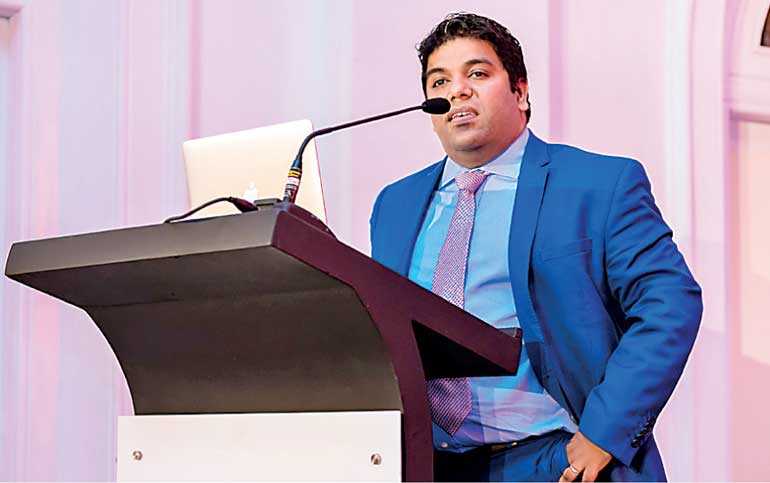Wednesday Feb 18, 2026
Wednesday Feb 18, 2026
Monday, 9 July 2018 00:00 - - {{hitsCtrl.values.hits}}

SLASSCOM Chairman Jeevan Gnanam
Newly appointed Sri Lanka Association of Software and Services Companies (SLASSCOM) Chairman Jeevan Gnanam commenced his tenure with the announcement of an ambitious vision to rapidly grow the country’s IT industry to Rs. 5 billion by 2022.
Speaking to a gathering of Sri Lanka’s most successful IT professionals, Gnanam commended the vital efforts of SLASSCOM and its leadership in laying out a strong foundation for the industry to commence a rapid acceleration in its growth momentum.
“I am fortunate to stand on the shoulders of great men and women who have come before me – from Madu Ratnayake to Mano Sekaram and Arul Sivagananathan to Ruwindhu Peiris, Chris Canekeratne to Tony Weerasinghe. All of them have contributed significantly in their own rights and dared to make a difference. So it is with cautious apprehension that I take over as Chairman full well knowing that these are big shoes to fill, knowing the decisions I make will have reverberations over industries and generations henceforth.
“I promise to carry this important legacy forward and explore every opportunity for SLASSCOM and the nation to grow. We are fortunate to have some of the brightest and most progressive minds in the country behind SLASSCOM and as a nation, I think we can see that the opportunities are almost palpable, and I believe in my core that our Rs. 5 billion target is achievable by 2022,” Gnanam stated.
Moving forward, he called for the industry to rally around a 5-point agenda focused around developing local capacity for Data Science and Artificial Intelligence, building a culture of innovation across the industry, economy and society, supporting start-ups, the promotion of regional integration internationally and locally, and the commencement of selective skilled employment immigration programmes in order to facilitate invaluable knowledge transfers.
“Sri Lanka’s services industry for the longest time has relied on two main pillars of excellence: Software Development and Finance and Accounting. This was primarily possible because of the large number of developers and finance and accounting graduates we had. However, I believe it is imperative that we now shift our mindset to focus on tomorrow’s jobs.
“Particularly with the large number of statisticians Sri Lanka has, I believe with some up-skilling we can create our third pillar of Data Scientists and AI engineers. Similarly, as a chamber, we need to go beyond IT and focus on becoming a chamber of innovation. This year we include not only Tech or IT related companies but also ones that have a thirst for Innovation. Thanks to Ruwindhu and his team, we have already reached out to huge corporates like JKH, MAS, and Brandix, and are creating an Innovation Forum within SLASSCOM to take this forward,” Gnanam explained.
Elaborating further on his key priorities to take the industry to Rs. 5 billion, he called for the re-branding of Sri Lanka as a start-up nation, through the implementation of policy reforms to facilitate a more start-up friendly culture so that small tech and fintech companies are incentivised to experiment in a sandbox environment, while encouraging innovations like crowd funding to drive micro investments into the sector.
Gnanam also called for greater utilisation of existing and future Free-Trade Agreements (FTA) to build bridges and deepen regional integration between public and private sectors. Similarly, he also called for greater regional integration within Sri Lanka by encouraging local companies to set up satellite operations in Tier 2 cities or towns like Negombo and Ja-ela while also exploring the possibility of selective skilled employment migration.
“While I believe this might make me unpopular, I’m not worried because I’m not here to win a popularity contest. I truly believe if we want to become Singapore we need to think like Singaporeans. In many cases we simply do not have the skill sets necessary to make this transition within the country, and in such cases when necessary, we must look to importing quality personnel from neighbouring countries to help fill these gaps.
“There must of course be clear and defined policies to ensure that such processes occur without disadvantaging local talent, but we also need to ensure that we are open to new, global thinking. If managed correctly, I am confident that we can strike an optimal balance that will power this industry and the economy forward,” Gnanam asserted.
Serving as a catalyst for growth and development within the Sri Lankan IT and BPM industry, SLASSCOM facilitates trade and business, the propagation of education and employment and encouragement of research and innovation through the creation of a progressive national policy framework.